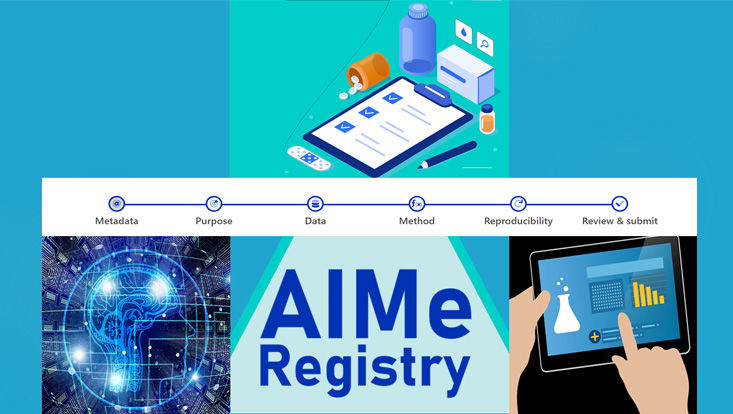AIMe - A Standard for Artificial Intelligence in Biomedicine
An international research team with participants from several universities including the University of Hamburg has proposed a standardised registry for artificial intelligence (AI) work in biomedicine to improve the reproducibility of results and create trust in the use of AI algorithms in biomedical research and, in the future, in everyday clinical practice. The scientists presented their proposal in the scientific journal "Nature Methods".

AIMe
In the last decades, new technologies have made it possible to develop a wide variety of systems that can generate huge amounts of biomedical data, for example in cancer research. At the same time, completely new possibilities have developed for examining and evaluating this data using artificial intelligence methods. AI algorithms in intensive care units, e.g., can predict circulatory failure at an early stage based on large amounts of data from several monitoring systems by processing a lot of complex information from different sources at the same time, which is far beyond human capabilities.
This great potential of AI systems leads to an unmanageable number of biomedical AI applications. Unfortunately, the corresponding reports and publications do not always adhere to best practices or provide only incomplete information about the algorithms used or the origin of the data. This makes assessment and comprehensive comparisons of AI models difficult. The decisions of AIs are not always comprehensible to humans and results are seldomly fully reproducible. This situation is untenable, especially in clinical research, where trust in AI models and transparent research reports are crucial to increase the acceptance of AI algorithms and to develop improved AI methods for basic biomedical research.
To address this problem, an international research team led by the Computational Systems Biology group from the University of Hamburg and the Biomedical Network Science Lab at the Friedrich-Alexander University Erlangen-Nürnberg has proposed AIMe (Registry for Artificial Intelligence in biomedical Research), a community-driven registry that enables users of new biomedical AI to create easily accessible, searchable and citable reports that can be studied and reviewed by the scientific community.
The freely accessible registry consists of a user-friendly web service that guides users through the AIMe standard and enables them to generate complete and standardised reports on the AI models used. A unique AIMe identifier is automatically created, which ensures that the report remains persistent and can be specified in publications. Hence, authors don’t have to cope with the time-consuming description of all facets of the AI used in articles for scientific journals and simply refer to the report in the AIMe registry.
Since the registry is designed as a web platform maintained by the scientific community, every user can ask questions about existing reports, make comments or suggest improvements. This feedback from the community will also be included in the annual update of the AIMe standard, and interested researchers can join the AIMe Steering Committee to become more involved in the further standardisation of biomedical AI.
"The AIMe Registry, in addition to providing easy registration of AI methods in citable form, also provides the ability to search for existing AI systems relevant to the application area. This means that researchers do not have to reinvent the wheel every time and can be sure that the AI method used has been evaluated and adheres to the AIMe standards," reports Prof. Jan Baumbach from the Centre for Bioinformatics at the University of Hamburg.
Original publication
Other news from the department science

Get the analytics and lab tech industry in your inbox
By submitting this form you agree that LUMITOS AG will send you the newsletter(s) selected above by email. Your data will not be passed on to third parties. Your data will be stored and processed in accordance with our data protection regulations. LUMITOS may contact you by email for the purpose of advertising or market and opinion surveys. You can revoke your consent at any time without giving reasons to LUMITOS AG, Ernst-Augustin-Str. 2, 12489 Berlin, Germany or by e-mail at revoke@lumitos.com with effect for the future. In addition, each email contains a link to unsubscribe from the corresponding newsletter.






















































